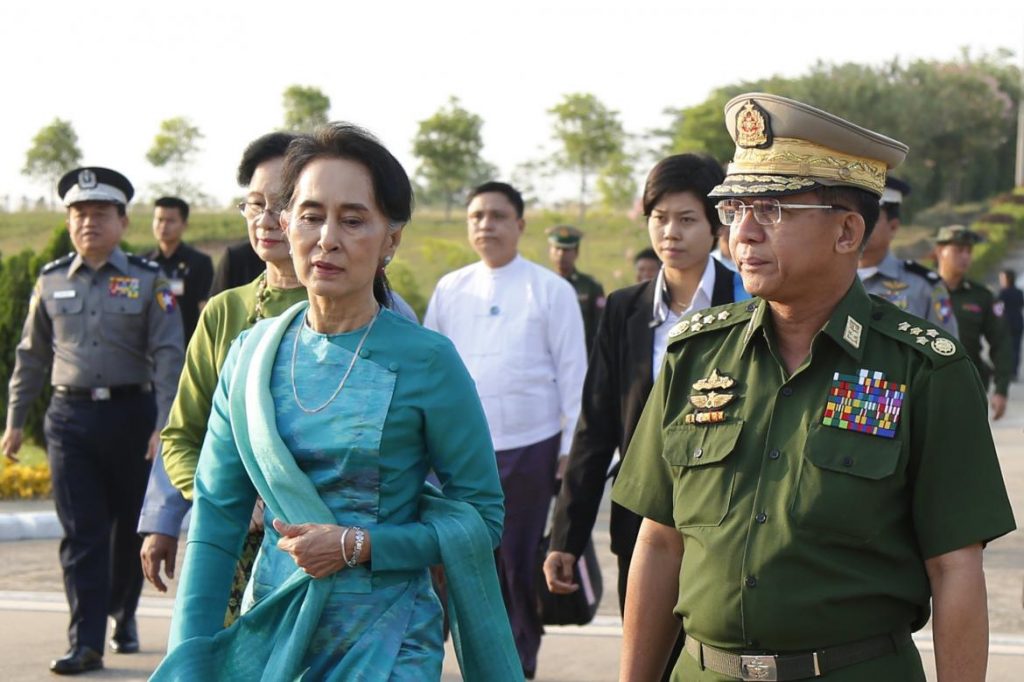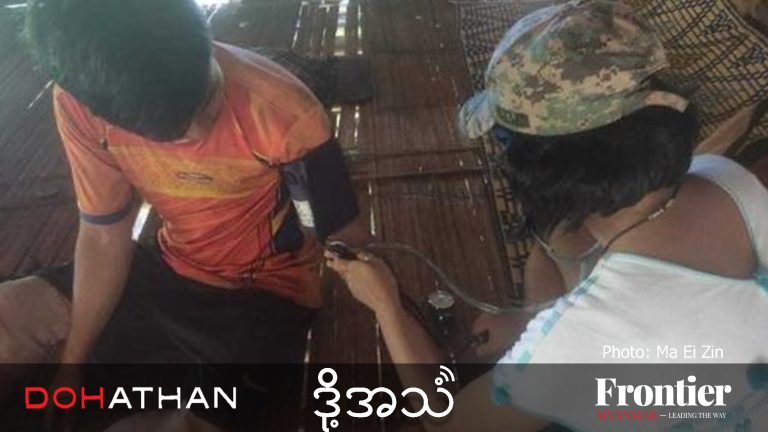The relationship between the government and the Tatmadaw was never going to be easy, as has been evident by delicate manoeuvering on some key issues.
By SITHU AUNG MYINT | FRONTIER
IT IS almost a year since the National League for Democracy government took office. The government, democratically elected by the people, and the Tatmadaw have been functioning in parallel for the past 12 months.
What hopes and expectations does the Tatmadaw have and what is its attitude towards the civilian government? How does the civilian government, headed by State Counsellor Daw Aung San Suu Kyi, regard the Tatmadaw?
The practical implications of the relationship are crucial because it can pave the way for peace, economic development and a federal democratic Union.
On March 27 the nation will mark the 72nd Armed Forces Day. It commemorates the start of the revolt by the Burma National Army under General Aung San against its former ally, the Japanese Imperial Army, in 1945.
Support more independent journalism like this. Sign up to be a Frontier member.
The Tatmadaw has adopted a four-point slogan for its celebrations marking this year’s Tatmadaw Day. They include protecting the government from those who are opposing its activities, maintaining the path of democracy chosen by the people, working for a permanent peace by upholding its six policies and cooperating with the government.
This shows that the Tatmadaw is prepared to travel along the road towards democracy and that in peace-making it accepts the government’s leadership but will insist on its own policies. At the same time, a slogan is just a slogan. Let’s see what’s really happening.
Up to now, the Tatmadaw has existed as an autonomous organisation, independent of government. Commander-in-Chief Senior General Min Aung Hlaing has been able to retain his position despite reaching the mandatory retirement age of 60. He said this was in accordance with a directive issued by the Defence Services Council in 1973 allowing officers to remain in active service for as long as they were needed. (In 2013, the 1959 Defence Services Act was amended to set a mandatory retirement age of 65 for a Tatmadaw chief.)
In line with the 2008 Constitution, the Tatmadaw manages military affairs. Although the defence budget is approved by the Hluttaw, neither the government nor the Hluttaw know how it is allocated within the military and for what purpose.
There have been positive changes at Tatmadaw-owned companies, including the conglomerates Myanmar Economic Holdings Ltd and Myanma Economic Corporation. MEHL began making the transition to a public company in 2016 and subsidiaries of both conglomerates are among the nation’s top taxpayers.
On the quest for national peace, Aung San Suu Kyi and the NLD government have broadly followed the path laid down by the previous U Thein Sein administration – beginning with the a Nationwide Ceasefire Agreement followed by political dialogue and then constitutional amendments to establish a federal democratic Union – without any significant disagreement with the Tatmadaw.
The government’s leadership on the peace process has been accepted by the Tatmadaw on the condition it is based on six principles set by the military. These six “principles for peace” include adhering to the 2008 Constitution, upholding national sovereignty and agreeing to remain in the Union.
The Tatmadaw therefore is unlikely to accept the demands of the United Wa State Army, which has rejected the NCA and proposed fresh negotiations. The recent stand taken by the UWSA and other groups opposed to signing the NCA might prove to be a big setback for Aung San Suu Kyi’s efforts to achieve peace and national reconciliation.
On the situation in Rakhine State, there are big differences between the NLD government and the Tatmadaw. Aung San Suu Kyi has had a tentative policy on the Rakhine conflict since before her party took office. The policy has put emphasis on the need to maintain the rule of law, implement development projects and, despite opposition, to review the 1982 Citizenship Law.
Min Aung Hlaing takes a hardline approach to the situation in Rakhine and wants the people who identify as Rohingya to be verified against the 1982 Citizenship Law. He wants residents who do not qualify to become citizens to be housed in special camps where they will be supported by international organisations until they can be sent to any country that accepts them for resettlement.
The most significant tension in the relationship between the government and the Tatmadaw over the past year has arisen because of the January 29 assassination of the lawyer U Ko Ni, a constitutional expert and legal adviser to the NLD.
A statement by the Ministry of Home Affairs – one of three ministries headed by ministers appointed by the Tatmadaw – said that three of the four suspects it has named are former Tatmadaw officers.
The NLD is not satisfied with the investigation into the killing of the man who has been credited with devising the position of state counsellor, a move that infuriated the military. NLD spokesperson and central executive committee member U Win Htein said a comment by Home Affairs Minister Lieutenant-General Kyaw Swe that Ko Ni’s death was the result of “extreme patriotism” was fanning a burning fire.
A year since the NLD took office, the Tatmadaw continues to function independently of the government in line with the constitution. Aung San Suu Kyi is taking every step with extreme caution to ensure that the country does not go backwards, to the situation that prevailed before 2011.
So far, the generals leading the Tatmadaw have indicated they will not reverse the course of the transition. But they have also shown they do no intend to come under the control of a civilian government.







